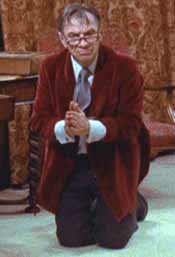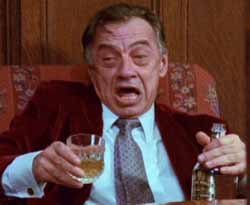 Secret Honor (1984)
Secret Honor (1984)Director: Robert Altman
The legacy of Richard Milhous Nixon, the 37th president of the United States, is a complicated one. Nixon was a ruthless, paranoid, relentless hunter and destroyer of perceived communists in the 1950s, but he actively courted the friendship of communist China, becoming the first U.S. president ever to visit the country, in 1972. He was revealed to be a savage bigot who threw around the words “kike,” “spic,” “nigger,” and “wop,” but his best friend, “Bebe” Rebozo, was Cuban. He employed future ultraconservatives Pat Buchanan and Dick Cheney on his administrative staff and nominated William Rehnquist to the Supreme Court, but his policies on the environment, the social safety net, and nuclear arms limitations were quite liberal.
Nixon was the ultimate comeback kid in politics. He rose from several significant political defeats, including the loss of the presidency to John F. Kennedy in 1960, to being elected for a second term as president in 1972 by the widest margin in history. Only two years later, to avoid impeachment proceedings related to his role in the break-in at the Democratic Party headquarters at the Watergate office complex in Washington, D.C., he became the only U.S. president to resign the office. At the time Secret Honor was made, Nixon appeared to be buried in shame forever, but he had already started to rehabilitate his image. By the time of his death in 1994, Nixon was admired by many as a wise elder statesman.
The purported last days of Nixon’s presidency seem to be the leaping-off place for Donald Freed and Arnold M. Stone’s screenplay for Secret Honor, based on their play of the same name. Nixon was said to have gone quite mad at the end, talking to paintings of presidents past and raging at his persecutors, real or
 imagined. Although the film takes place at his New Jersey estate long after Nixon (Philip Baker Hall) has become a private citizen, Nixon’s mental deterioration seems to have progressed to an astonishing degree. Of course, his lunacy may have something to do with the decision he appears to have made to end his life. He sits down at his desk with a Chivas neat, places a revolver in front of him, and fumbles helplessly trying to get his tape recorder to record. An audience who knows of Nixon’s obsession with taping his conversations must certainly find his ineptitude with the machine hilariously ironic. I wondered whether he might shoot it instead of himself.
imagined. Although the film takes place at his New Jersey estate long after Nixon (Philip Baker Hall) has become a private citizen, Nixon’s mental deterioration seems to have progressed to an astonishing degree. Of course, his lunacy may have something to do with the decision he appears to have made to end his life. He sits down at his desk with a Chivas neat, places a revolver in front of him, and fumbles helplessly trying to get his tape recorder to record. An audience who knows of Nixon’s obsession with taping his conversations must certainly find his ineptitude with the machine hilariously ironic. I wondered whether he might shoot it instead of himself.Eventually, the recorder is made to function, and Nixon launches into a long and harrowing rant about his life in the form of a lawyer presenting a case to a judge. He is the lawyer with his foolish self as the client. His envy of his golden-boy brother Harold, lost to TB at the age of 17, sets the stage for his escalating list of backstabbers and persecutors, ranging from Dwight Eisenhower, for whom he served as Vice President, to the Kennedys, to some of the players in the Watergate scandal. He muses about his White House counsel, John Dean, who testified against him in the Watergate hearings, saying, “If John Dean hadn’t existed, I would have had to invent him!”
Indeed, this Nixon has invented a lot of things to explain his actions over the course of his life. He claims to have been in league with a so-called Committee of 100, a business cabal that chose him as their man in Washington and backed his career. Their ultimate aim, Nixon says, was to usher in the new nexus of world power, the Pacific Rim countries, which they would do by having Nixon serve a third term as president so that he could continue the Vietnam War.
 Nixon constantly rails against the Eastern establishment that treated him like a hick Quaker from the sticks. “The Founding Fathers were nothing more than a bunch of snobby English shits,” he spits. Nixon’s self-pity at the snubs he has received track perfectly with his weepy self-justifications in real life, including his declaration after losing the 1962 race for governor of California ("You don't have Nixon to kick around anymore. Because, gentlemen, this is my last press conference.") and his infamous 1952 Checkers speech to address questions about whether he was using political donations improperly ( “We did get something, a gift, after the election. …It was a little cocker spaniel dog, in a crate ... sent all the way from Texas, … and our little girl Tricia … named it Checkers. And you know, the kids … love the dog, and … regardless of what they say about it, we're gonna keep it.”)
Nixon constantly rails against the Eastern establishment that treated him like a hick Quaker from the sticks. “The Founding Fathers were nothing more than a bunch of snobby English shits,” he spits. Nixon’s self-pity at the snubs he has received track perfectly with his weepy self-justifications in real life, including his declaration after losing the 1962 race for governor of California ("You don't have Nixon to kick around anymore. Because, gentlemen, this is my last press conference.") and his infamous 1952 Checkers speech to address questions about whether he was using political donations improperly ( “We did get something, a gift, after the election. …It was a little cocker spaniel dog, in a crate ... sent all the way from Texas, … and our little girl Tricia … named it Checkers. And you know, the kids … love the dog, and … regardless of what they say about it, we're gonna keep it.”)Philip Baker Hall gives what might be the performance of the century as he reprises his stage appearance for Robert Altman’s camera. I have read that because Secret Honor is almost a complete interpolation of the stage play to the screen that Hall’s seeming overacting is, in reality, an exercise in stage acting. I disagree with this assessment. Hall does not seem to be overacting to me. Nixon was a self-aggrandizing, grandstanding man in public and a foul-mouthed, paranoid bigot in private. I can well imagine Nixon in a frenzied stream-of-consciousness about every detail of his life, and I think Hall did a tremendous job of remaining absolutely objective toward his character.
 There are moments when we can almost pity Nixon, such as when he opens his mother’s bible and lovingly gazes at the photos and remembrances pressed between its pages. But the scheming, grasping Nixon is always in plain view, Shakespeare’s Richard III in a red smoking jacket. His line about his motivation in life could be a line out of Shakespeare: “Resolve to win—period—because that is the American system. You take either side—it doesn't even matter which one—and you go on the attack.”
There are moments when we can almost pity Nixon, such as when he opens his mother’s bible and lovingly gazes at the photos and remembrances pressed between its pages. But the scheming, grasping Nixon is always in plain view, Shakespeare’s Richard III in a red smoking jacket. His line about his motivation in life could be a line out of Shakespeare: “Resolve to win—period—because that is the American system. You take either side—it doesn't even matter which one—and you go on the attack.”Altman can’t really add much to this stagebound production, but his well-known technique of overlapping dialog seems to come into play here as Hall’s Nixon interrupts himself, jumps about from topic to topic, confusing us and giving us an immediacy to events that, for him, may be long past. Altman also frames the four television monitors and the closed-circuit camera Nixon uses to watch himself to emphasize the claustrophobia and narcissism infecting this man.
I'm old enough to remember many of the events and participants of the Nixon years, and I know enough about the 50s to recognize the names Alger Hiss, Whittaker Chambers, and the Rosenbergs. I think for people unfamiliar with Nixon's history, this film will make very little sense, and I fear that this astonishing performance by Hall will be forgotten forever someday.
But a notion Freed and Stone explore that remains of interest is why Nixon kept coming back long after he should have been buried politically. This is what they think: “I would be a winner because I was a loser! That's right. I dream of failure every night of my life, and that's my secret. To make it in this rat race you have to dream of failing every day. I mean, that is reality.” I’m not so sure. But when I look at the popularity of the perennially losing Chicago Cubs all over North America, I wonder if maybe they weren’t on to something.
Regardless, I'm not sure that the appeal of the loser Cubs is the same as that of Nixon. The final "Fuck 'em," in which Altman repeats again and again Nixon uttering these words and flinging an upper cut into the air in defiance is shocking and the last nail in the coffin for Nixon apologists. He doesn't need or want them--and he doesn't deserve them.l


4 Comments:
At 9:11 AM, Mark said…
Mark said…
Marilyn, please delete my post if you feel it's too political for a movie blog. The recent news about GW Bush and Cheney authorizing a leak (according to Scooter Libby's testimony) to discredit Joseph C. Wilson, reflects my feelings of "Secret Honor." Wilson challenged the administration's contention that Iraq was seeking nuclear material in Africa. The leak resulted in the exposure of an undercover C.I.A. agent, Wilson's wife, Valerie Plame. It may have been legal for Bush to leak information but it is also hypocritical, even unethical, considering his stance on leakers. It reminds me of Nixon. Your "Secret Honor" review could not have been better timed for it's pertinence.
www.moviemasterworks.com
At 12:53 PM, Marilyn said…
Marilyn said…
Thanks for your comments, Mark. I am interested in the political aspects of film, and I love documentaries. Many of my reviews are political, and I have a definite bias against Nixon. However, I must emphasize that I don't think the film--and especially Philip Baker Hall--had a similar strong bias. It is interesting that Cheney trained with the trickster of them all. The Plame leak is right up his alley.
At 11:08 AM, Anonymous said…
Anonymous said…
Hey Marilyn,
I read your post about "You Are What You Eat." I've been looking for that film FOREVER. Are you still interested in selling it "cheap?"
Thanks,
Jon in Orlando
At 11:20 AM, Marilyn said…
Marilyn said…
Where did you read that??? It's long gone. Try e-bay. That's where it came from originally.
Post a Comment
<< Home